|
|
| |
| EVENTS |
|
|
> Short Course for Parliamentarians on Budget Process and Analysis
|
| |
|
June 7, 2006
Hotel Marriott, Islamabad
|
|
| |
Yashwant Sinha, former Indian Minister of Finance and External Affairs explained in detail the parliamentary budget process in India to Pakistani parliamentarians in a parliamentary development course for Pakistani parliamentarians organised by Pakistan Institute of Legislative Development And Transparency (PILDAT). Addressing a multi-party assemblage of Pakistani parliamentarians, Sinha said that Indian parliament discusses the budget for 75 days and its ministries-related standing committees examine the demands for grants for 3 weeks before Lok Sabha passes the budget. He also highlighted that Indian parliament receives supplementary budgets three times a year. In addition the Finance Minister presents an implementation statement about the previous year�s budget while presenting the next year�s budget, he added. Sinha, who faced a number of questions from Pakistani parliamentarians about the Indian parliamentary practices, explained that the Defence Budget in India is presented in as much detail as the budget of any other ministry.and the defence budget also goes through adetailed parliamentary scrutiny. He also explained the system of National Finance Commission in India and said that the NFC awards are never challenged by the parliament though parliament hasthe final authority to approve it. Earlier Omar Ayub Khan, Minister of State for Finance and Revenue, personally endorsed the Pakistani parliamentarians demand to involve parliamentary standing committees in the pre-budget and post-budget phases. He said that parliament is souveriegn and it can change the rules of procedure to involve the parliamentary standing committees in the budget process. He called for a greater dialogue to debate various points of view on national economy and the budget. He said that he would welcome a PILDAT-sponsored discussion on contending opinions about the budget. He said that Ministry of Finance will present full details and rationale of its policies if such a discussion is organized. The course featured a comparison of the parliamentary budget processes in Pakistan and India. It was the second part of the course on Budget process in which Budget Analysis techniques for parliamentarians was discussed. Well-known Pakistani economist Professor Kaiser Bengali presented historical analysis of the key features of Pakistani Budget since1973. He pointed out that poor segment of the society bears a relatively larger burden of taxes whereas rich contribute less. He also said that Sindh bears the maximum burden of taxes whereas NWFP bears the minimum burden. Omar Ayub Khan, the Minister of state on Finance disagreed with Kaiser Bengali and proposed to PILDAT to organize a wider discussion involving experts of the Ministry of Finance. A lively discussion on National Economy, powers of the parliament and the national budget dominated the proceedings of the course which was attended by parliamentarians of all major parties in the parliament. |
|
| |
Parliamentarians, both from the treasury and opposition, were unanimous in demanding greater and more meaningful role of the parliament and standing committees in thepre-budget and post-budget phases. It was pointed out that the Budget session in Pakistan generally lasts for a week or so. National Assembly is set to debate this year�s budget for just 5 days.
|
|
| |
|
|
| |
|
|
| |
|
|
| |
|
|
| |
|
|
| |
|
|
| |
|
|
| |
|
|
| |
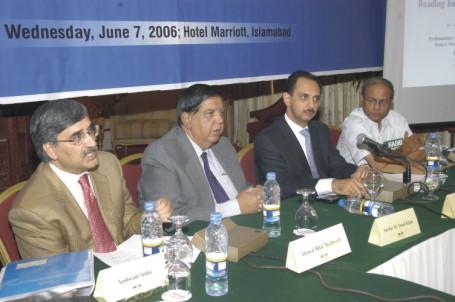
(From left to right) Mr. Ahmed Bilal Mehboob, Sardar M. Yusuf Khan, Mr. Omar Ayub Khan, Dr. Kaiser Bengali |
|
| |
|
|
| |
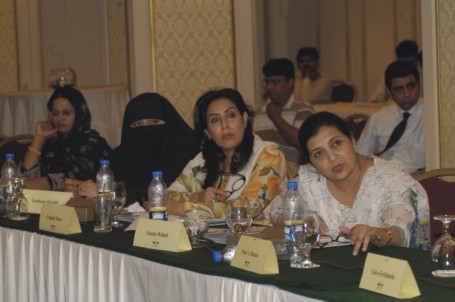
Participants at the Course |
|
| |
|
|
| |
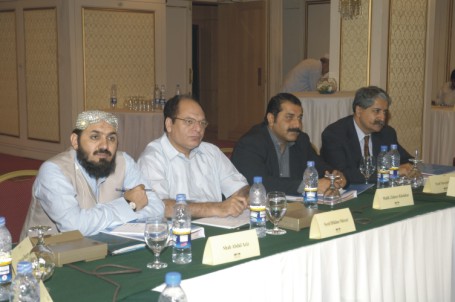
Participants at the Course |
|
| |
|
|
| |
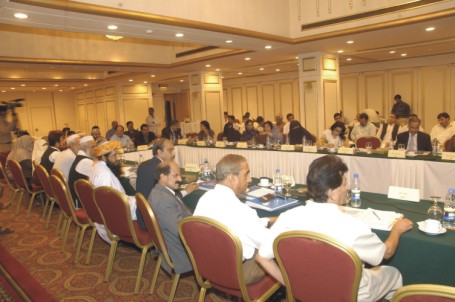
Participants at the Course |
|
| |
|
|
| |
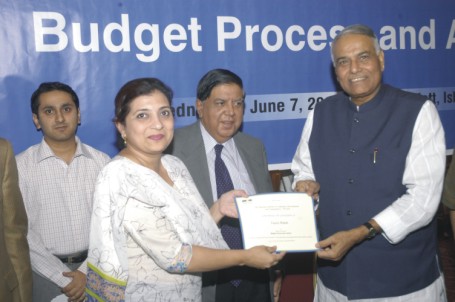
Participant receiving her certificate |
|
| |
|
|
| |
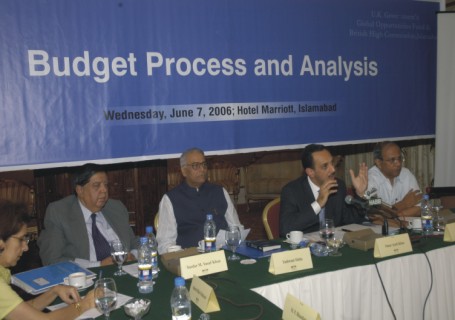
Sardar M. Yusuf Khan, Mr. Yashwant Sinha, Mr. Omar Ayub Khan, Dr. Kaiser Bengali |
|
|
|
|
|
|
|
|